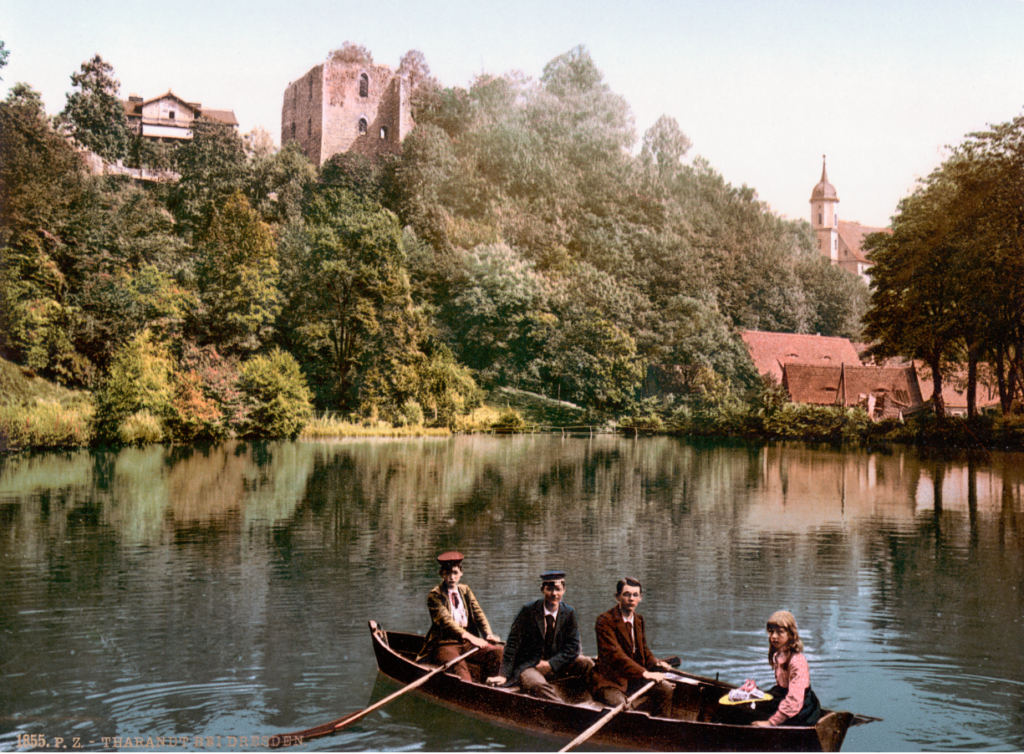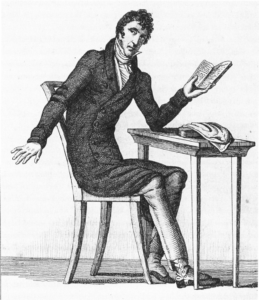Impromptu. Written in the ruins of Tharandt
(Poet's title: Impromptu. In Tharand's Ruinen geschrieben)
Set by Schubert:
D 513A
Schubert only sketched the first six lines[probably 1817]
Nur wer die Liebe kennt, versteht das Sehnen,
An dem Geliebten ewig fest zu hangen,
Und Lebensmut aus seinem Aug zu trinken.
Er kennt das schmerzlich selige Verlangen,
Dahin zu schmelzen in ein Meer von Tränen,
Und aufgelöst in Liebe zu versinken.
Wie mir die Bilder winken,
Die alten! – Ach, sie nahen, um zu fliehen.
Was hilft das Tal mit seinen grünen Gluten,
Die Strahlen, die so golden niederfluten,
Ich seh nur Geister mich zum Abgrund ziehen.
Wozu soll ich die goldnen Blüten pflücken,
Kann ich doch nimmer das Geliebte schmücken.
Am 9. August 1806.
Only someone who knows love can understand the longing
To hang on firmly to the beloved for eternity,
And to drink courage for life from his eyes;
He knows the painful, blessed craving
To melt into a sea of tears,
And to sink and dissolve into love! –
How those images signal to me,
Those old ones! – Oh, they approach only to fly off! –
What help is the valley with its green glow,
The beams which flow down in such a golden way,
All I see is spirits pulling me down to the abyss! –
What is the point of me plucking those golden blossoms
If I can never adorn my beloved with them.
On the 9th August 1806
All translations into English that appear on this website, unless otherwise stated, are by Malcolm Wren. You are free to use them on condition that you acknowledge Malcolm Wren as the translator and schubertsong.uk as the source. Unless otherwise stated, the comments and essays that appear after the texts and translations are by Malcolm Wren and are © Copyright.
☙
Themes and images in this text:
Courage Drinking Eternity Eyes Longing and yearning Pain The sea Tears and crying Under the water, sinking and drowning
The poet is remarkably specific about the time and place. He was looking around the ruins of the old castle at Tharandt (near Dresden) on 9th August 1806, a matter of weeks before Saxony would be dragged into an ill-fated alliance with Prussia against Napoleon, who had crushingly defeated the Holy Roman Empire the previous winter. However, it was not this existential threat to the homeland that preoccupied Werner on that occasion. The sunlit landscape, glowing green and gold (presumably corn ready for harvesting as well as the August flowers that he would have liked to pick), only intensified his sense of loss. There is no longer anyone to pick the flowers for. He wants to dissolve into a sea of tears; he has now lost the courage to live life.

☙
Original Spelling Impromptu. In Tharand's Ruinen geschrieben Nur wer die Liebe kennt, versteht das Sehnen, An dem Geliebten ewig fest zu hangen, Und Lebensmuth aus seinem Aug' zu trinken; Er kennt das schmerzlich selige Verlangen, Dahin zu schmelzen in ein Meer von Thränen, Und aufgelöst in Liebe zu versinken! - Wie mir die Bilder winken, Die alten! - Ach, sie nahen, um zu fliehen! - Was hilft das Thal mit seinen grünen Gluthen, Die Strahlen, die so golden niederfluthen, Ich seh' nur Geister mich zum Abgrund ziehen! - Wozu soll ich die goldnen Blüthen pflücken, Kann ich doch nimmer das Geliebte schmücken. Am 9. August 1806.
Confirmed by Peter Rastl with Die Harfe. Herausgegeben von Friedrich Kind. Zweites Bändchen. Leipzig bei Georg Joachim Göschen 1815, page 362. Beneath the poem: “Am 9. August 1806.”
To see an early edition of the text, go to page 362 [374 von 380] here: http://digital.onb.ac.at/OnbViewer/viewer.faces?doc=ABO_%2BZ178040604


